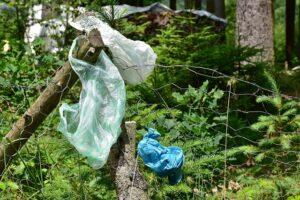Greenpeace and Humus assess whether the bags sold as degradable actually decompose
Greenpeace Hungary, together with the Humus Association, buried plastic bags purchased from domestic food chains and offered as degradable in the Humus composter to check whether the bags decompose and, if so, how long – informed MTI in its statement on Friday organization.

(Photo: Pixabay)
They point out that the compost included bags marked “compostable” purchased from the vegetable, fruit and bakery departments of four food chains, as well as from the cash registers. The survey will last 12 months, but during the experiment the two organizations will communicate the results from time to time, they said, adding that the decomposition of the composted bags will be examined first after 45 days, and then after 3, 6, and 12 months. Simon Gergely, Greenpeace Hungary’s chemical expert, stated in the announcement that it is a good practice that more and more supermarket chains are only giving away bags for money, thus reducing the use of disposable plastics. He added: on the other hand, the problem is that most households do not have a home composter, and degradable plastic cannot be recycled as plastic, and if it ends up in the selective waste bin, it also contaminates the plastic to be recycled.
Degradable plastics are not sorted
The expert adds that, according to current experience, degradable plastics mostly end up in the regular trash, and in the worst case, after use, people throw them in the selective waste collection for traditional plastics. György Szabó, head of the zero waste program of the Humus Association, points out in the statement that some of the degradable bags available in stores are labeled “industrial compost”, but this is difficult for the public to understand. This means that when they become waste, they are only composted under industrial conditions, under suitable temperature, pressure and humidity. The program manager points out that compost could be made from the bags if they were placed in the bins specifically intended for industrially degradable plastics and organic waste, then collected and transported, however, currently there are no systems developed for the treatment of degradable plastic waste in Hungary that can satisfy the needs of the public. He adds that if bioplastics end up in landfills, methane is released due to the oxygen-free conditions prevailing there, which is unfavorable from a climate protection point of view.
In their statement, the two green organizations emphasize that if such a bag ends up in nature, it causes similar natural damage in many respects as its counterparts made from petroleum
According to some research, people are more inclined to throw away bioplastics, thinking that they decompose in nature anyway. The report points out that the real solution to the plastic crisis and curbing the flow of waste would be to remove disposable bags and to radically reduce all other single-use packaging materials, and manufacturers and distributors should strive to spread packaging-free, refillable and reusable products as widely as possible. systems. In their statement, the green organizations emphasize that they have repeatedly drawn the attention of decision-makers to the fact that degradable plastics are not a real solution to the waste crisis.
In Hungary, in 2021, the decree came into force that partly prohibits and significantly taxes the distribution of plastic bags. The decree also covers degradable bags, but an environmental protection product fee of about a quarter of that of traditional plastic alternatives has been set for them.
MTI
Related news
K&H: collaboration with the capital in the name of climate neutrality
Budapest Metropolitan Municipality and K&H Bank have signed a Memorandum…
Read more >Bored mobile phones are valuable – 1,500 small electronic devices were brought back to Auchan for recycling
For the third time, the Auchan department store chain has…
Read more >AM: Hungarian grasslands represent significant value, their preservation is also supported by the government
The Grassland-HU LIFE integrated project plays a key role in…
Read more >Related news
GKI analysis: Why do Hungarian households live more poorly than anyone else in the EU?
Imagine that the residents of every EU country shop in…
Read more >KSH: industrial producer prices decreased by 0.7 percent in May 2025 compared to the previous month, and increased by an average of 6.9 percent compared to a year earlier
In May 2025, industrial producer prices were 6.9 percent higher…
Read more >Consumption drives the economy
According to the latest forecast by the Balance Institute, the…
Read more >






